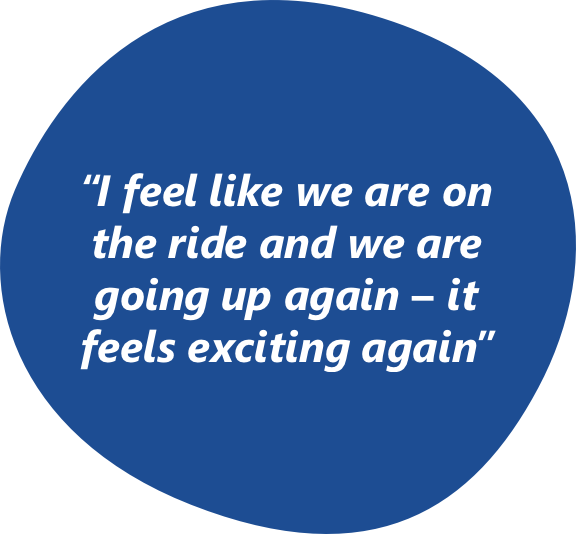DSA profile
The recent acquisition of Disability Services Australia (DSA) means the opportunity to share knowledge, values, history, and decades of experience.
The recent acquisition of Disability Services Australia (DSA) means the opportunity to share knowledge, values, history, and decades of experience.
Like Scope, DSA began with a group of parents frustrated by the lack of support available to their children with disabilities. In the 1950s, children with disabilities received minimal education and limited basic skills training. Without employment, they faced institutionalisation or a lifetime of reliance on meagre government support and living with ageing parents.
Sharon Glase and Anne McNeilly, long-standing members of the DSA team, started in the 1990s as support workers.
“It’s a values-driven culture, very person-centred – that’s why I’ve stayed so long,” Sharon said. According to Anne, the organisation was known for being a pioneer in the disability space. “We were ahead of the times,” she said.
Back in 1957, parents of children attending Glenfield Park School were increasingly concerned about how they could further enrich their children’s lives. A boarding school in Sydney’s southwest, Glenfield Park School catered to roughly 128 children with mild to moderate intellectual disabilities and taught basic literacy and numeracy. Worried about the limited opportunities available to their children, parents joined forces to create the New South Wales Society for the Rehabilitation of the Retarded, later renamed Aid Retarded Persons (ARP).
ARP utilised the metaphoric motto and emblem of a “square peg in a round hole”, representing the difficulties faced by people with disabilities to fit with employment demands. Its first initiative was to set up what was known as a “sheltered workshop” in 1958, which allowed supported employees to learn skills and trades at a pace suited to each individual.
By 1968, there were 12 branches and a number of sheltered workshops providing training and skills to people with disabilities. Many supported workers were also supported to transition into mainstream factories where they acquired permanent, full-time work.
With their employment services expanding exponentially, ARP looked to establish “hostels” to help get adults with disabilities out of institutions where they were disregarded and neglected.
As people with disabilities became increasingly involved in the community, attitudes and language evolved. In the 1980s and 1990s, ARP underwent a series of name changes – first, to Amaroo, the Aboriginal word for “beautiful place”, and later to the encompassing Disability Services Australia. This reflected its range of innovative programs, like money management, sport, social, educational, and supported living programs.
Sharon and Anne said their early days at Amaroo and DSA were full of enthusiasm and growth.
“Back then, we were involved in everything, including writing tenders to the government, and we didn’t see it as hard work because it was so exciting and we were so personally invested,” Anne said. “All the hard work and effort we put in – we did, like, 48 tenders – was so we could have future growth, and we were successful in every one of our tenders, which was really significant,” Sharon revealed.
Watching the organisation transform and adapt has been tremendously rewarding.
“We have this sense of achievement because of how close and invested we were, and the growth in the company, the opportunities we have provided, and seeing the success of our [customers] has been a highlight,” Anne said.
Now, with Scope’s recent acquisition of DSA, Sharon and Anne are feeling a familiar sense of electricity in the air.
“I feel like we are back on the ride and we are going up again – it feels exciting again,” Sharon said.
“I’m staying until I retire…because we are on the way up again and I want to stick around and see what happens next,” Anne said.
“Scope is wanting to learn from us and we are learning from them, so if we can build on what DSA had, then we can bring us back up to where we were and beyond that.”

Growth
Growing our national footprint
Scope established a healthy base in New South Wales in 2021, focusing mainly on support coordination and establishing relationships with service providers. Plans to open several Supported Independent Living (SIL) homes were also set in motion, expected to be available in 2023.
By late 2021, an opportunity presented itself with Disability Services Australia (DSA). Scope’s selection as the preferred owner of DSA accelerated our growth and marked a significant milestone in our national expansion. With aligned values and complementary strategies and services, the coming together of Scope and DSA is a logical fit. Together with senior leaders from Scope and DSA, a robust 100-day transition plan was developed to support stabilisation and identify key priorities. DSA has since launched the SIL strengthening project, as well as other new opportunities for supported employees and school leavers.
Under Scope’s leadership, we are confident we can set DSA on a trajectory for success.
Welcoming customers and staff
In November 2021, Scope welcomed new staff and residents transferring from Uniting Vic.Tas. supported independent living. This opportunity arose following a review by Uniting Vic.Tas. that showed larger disability service providers, like Scope, are better placed to deliver services in this region.
This seamless transition ensured continuity of support for Uniting Vic.Tas. customers and their support teams. Together with DSA and our recently transferred teams from Uniting Vic. Tas. our growth over the last 12 months has strengthened our position as a leading national provider. We are helping even more people to live as equal and empowered citizens, supporting them to live the life they choose and achieve their goals.
Technology
The last financial year has been a period of stabilisation and setting up the ICT team for the next wave of transformational change.
This has enabled us to continue to deliver an outstanding customer and employee experience at scale. The acquisition of DSA presents an exciting opportunity to revisit our process and systems. The team is focused on streamlining and integrating systems that deliver a seamless experience at a national level.
A few key highlights include:
- The reorganisation of the IT team to increase focus on service delivery, security, strategy and architecture, and project and change management. This reorganisation is enabling the team to create a better experience for staff that enables them to focus on supporting customers.
- The introduction of several new systems to better manage customer enquiries and increase effectiveness of staff shift filling, as well as internal changes to improve our efficiency and responsiveness – from staff onboarding to more effective IT support management.
- An increase of 14 per cent in staff engagement – up at 83 per cent in our most recent survey.





